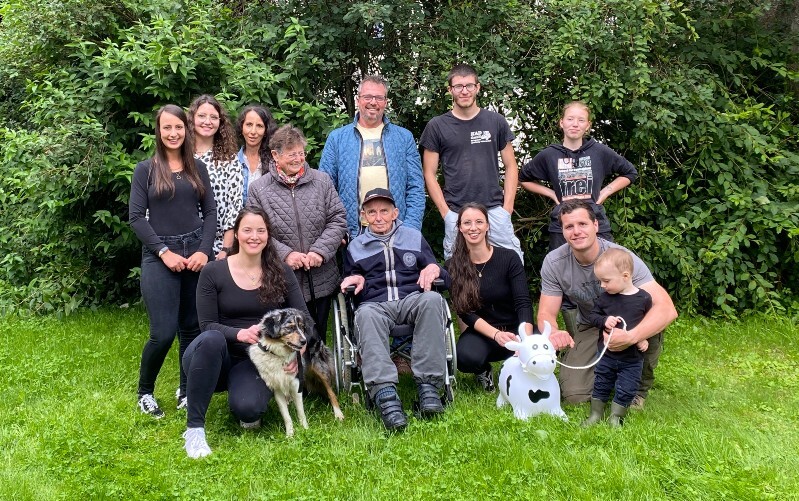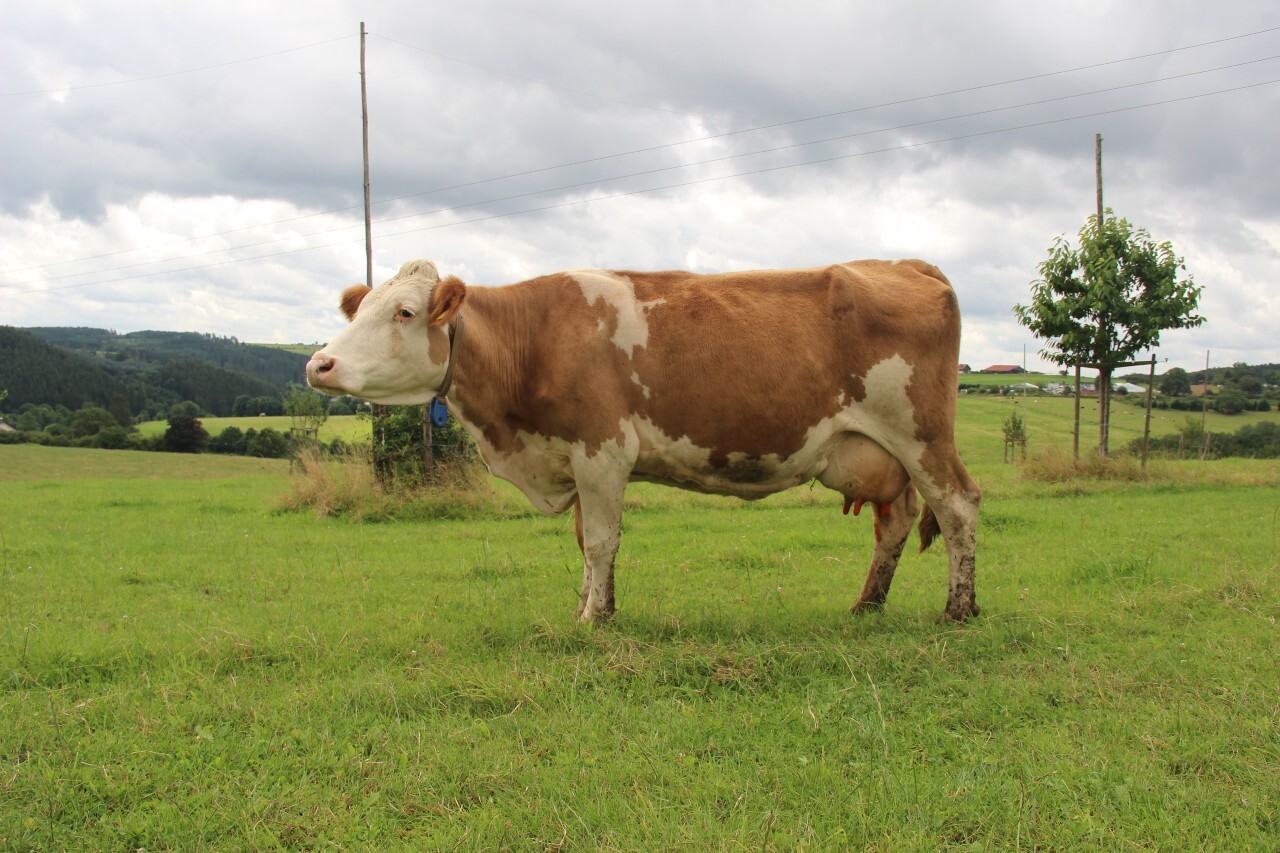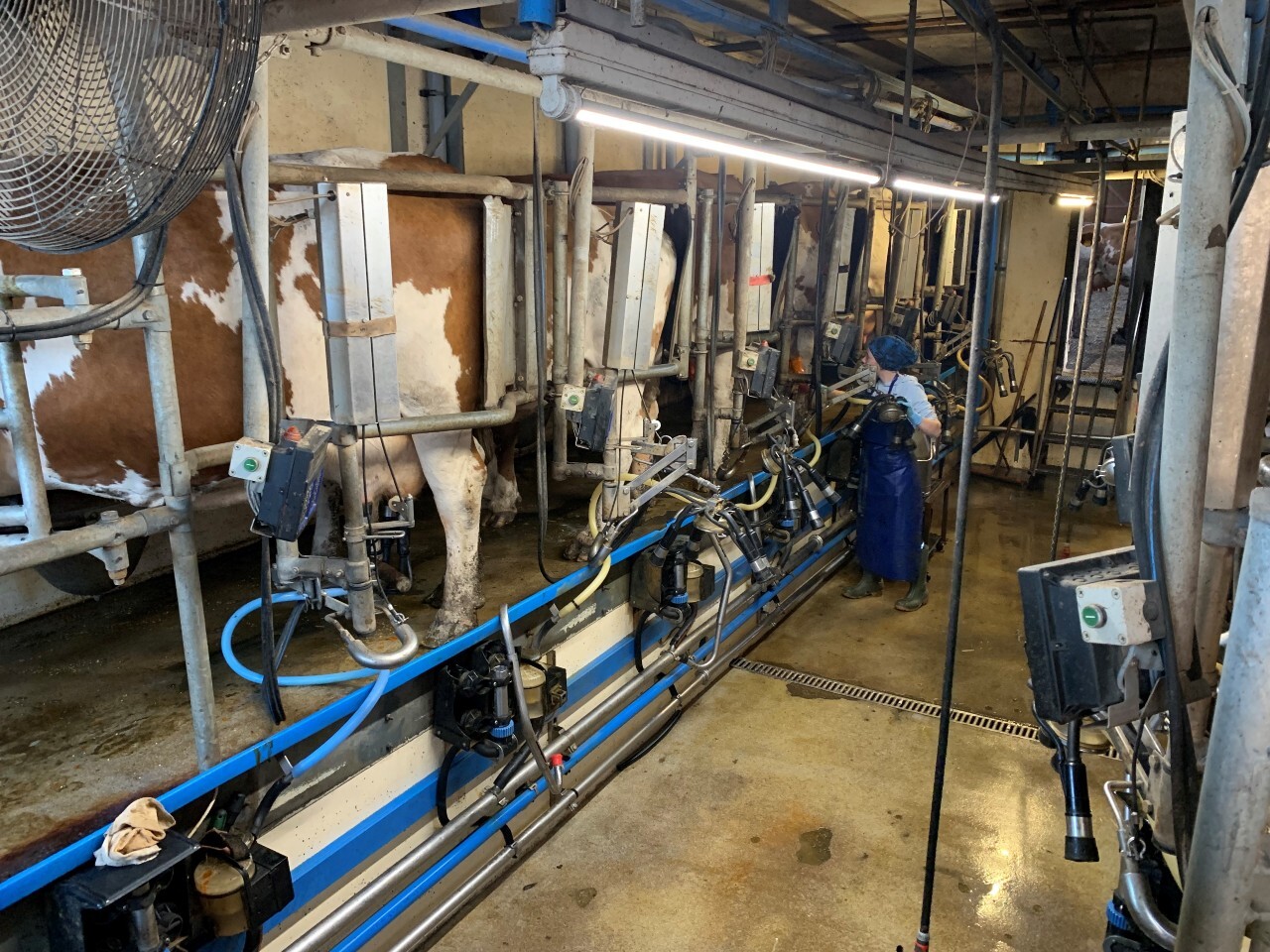Two years after Manfred Lenz qualified as a Master Farmer in 1990, he took over Frühlingshof from his father Richard, who is now 88 years old. Another two years later, Manfred converted the business to organic farming with the help of his father. One reason for this step was that their yield had remained constant over the years despite their increasing use of mineral fertilisers. “Even before the conversion, we had already conducted some fairly successful clover grass trials without using mineral fertiliser,” says the Fleckvieh farmer. Another farm in the region had previously switched to organic farming and was laughed at for doing so. “In the beginning, I didn’t take organic farming seriously either. But when we looked into it more closely, it seemed like an interesting option to us.” The Lenz family has never regretted the change. “This way we can produce natural, healthy food from our land and animals.” The next big step came in 1999. At the time, the Lenz family was milking 40 cows and fattening bullocks. They abandoned their beef business and built a cubicle barn with a yard for 65 cows, which was expanded to 90 places in 2014. They also made another important change: “21 years ago I started to cross Fleckvieh into our Holstein herd – first with a stud bull and later with a sire from our own stock,” says Manfred. “Our Holsteins did not cope very well with the conversion. To feed Holsteins in line with their performance, it requires several components that we as an organic farm cannot buy in very easily. Fleckvieh cows are less demanding, because they are genetically better able to cope with higher proportions of basic ration.”
Fleckvieh fans with an organic focus

For Manfred Lenz (56), farming is not just a job, it is a passion, and he is proud to carry on the family business. Frühlingshof Farm has been in his family since 1791. Full-time employee Lars Germer and trainee Tanja Kribs support Manfred Lenz in his work. His family help as often as they can, especially his 26-year-old daughter Elisabeth. After high school, she trained as a farmer and farm manager, and realised during this time just how much she enjoys working with cows.
Organic farming

“Fleckvieh cows are less demanding, because they are genetically better able to cope with higher proportions of basic ration.”
Collaboration with CRV
The Lenz family breeds efficient, medium-sized, hornless cattle. A2A2 has been part of their breeding objective since 2016. “We are aiming for a strong, healthy herd and would like to be able to market A2A2 milk,” says Manfred, who has been working with CRV since 2012. Luisa Brückmann is his CRV sales consultant. “Luisa is very competent, and she actively supports me in selecting bulls. We are currently using the naturally hornless CRV Fleckvieh bulls Mercedes Pp and Hongkong PP, for example,” Manfred adds. He is impressed by the CRV Fleckvieh genetics. “Healthy cows with good conformation and consistently good performance – even when the feed quality is variable – are particularly important for organic dairy farming. Our daughters from CRV bulls consistently meet these requirements.”
Consumer-friendly
“We have been farming organically since 1994 and are trying very hard to be more and more responsive to consumer demands, especially with regard to animal welfare,” says Manfred Lenz. “For us, it is important that consumers know that farming is not synonymous with factory farming.” In 2015, we hosted a conference organised by Bioland at Frühlingshof. The event was geared towards farm managers who were considering converting to organic farming.

Outlook
“I hope that our work as dairy farmers will continue to be in demand and appreciated, and that we can continue to run the farm as a family business in the future,” says Manfred Lenz on the future prospects for his farm. He wanted to be a farmer from a very young age. “I love working with cows,” he adds. The succession plan for the farm is still unclear, however. Manfred says that survival is becoming increasingly difficult for farms. “Unfortunately agricultural policies are made by people who know very little about family farms. As a result, there are more and more requirements that we simply cannot meet.”
45 young Fleckvieh bulls from the elite ranks of the European population
Farms with a small herd of Fleckvieh cows and huge farms with hundreds of Holstein cows. Nowhere can such diversity be seen on dairy farms as in the Central European market. Numbering a population of about 1.4 million registered cows in Europe alone, Fleckvieh is the most commonly farmed dual-purpose breed in the world. And Fleckvieh comes in second to Holstein as a dairy breed. The homelands of Fleckvieh breeding are the south of Germany, Austria and the Czech Republic.
CRV has its own active Fleckvieh breeding programme in these countries. This breeding programme also enjoys access to the Fleckvieh populations in France, Italy and Croatia, for example. ‘The result is a wide range selected from the highest ranked, genomic tested young bulls and daughter-proven breeding bulls’, says Tobias Lerner, global product manager Fleckvieh. The focus in the breeding programme is on milk and beef production, longevity, persistency and late maturity, fertility and udder health. The traditional method of selecting bulls is purchasing the animals offered for sale by breeders at the top cattle auctions. Some of these bulls are purchased together with the Austrian AI organisation Genostar. But CRV now also selects young animals with high genomic breeding values from proven cow families. Contracts are agreed with the breeders of these animals about mating with the highest ranking bulls. The bull calves with the highest genotyped breeding values that result from these selections are transferred to the barns at CRV. Around 45 young Fleckvieh bulls become available every year, including the bulls purchased at auctions.
